Transferts monétaires et mobilité humaine
Les transferts monétaires sont souvent utilisés lors de crises afin de répondre aux besoins des personnes migrantes. Dans cette page, vous trouverez des ressources sur les transferts monétaires et la migration.

La Croix-Rouge se prépare à fournir une aide humanitaire aux migrant·es de la caravane sur le point de quitter le Honduras pour le Guatemala.
©Johannes Chinchilla / FICR.
Conflits, crises économiques et catastrophes sont autant de raisons ayant contraint des personnes à fuir et à traverser des frontières dans des conditions éprouvantes et risquées, en quête de sécurité et de moyens de subsistance. En 2020, le nombre de personnes déplacées de force s’est envolé au niveau sans précédent de plus de 80 millions de personnes, soit près du double du nombre enregistré il y a une dizaine d’année. Cette tendance s’aggrave et les effets du changement climatique menacent de déplacer jusqu’à 200 millions de personnes d’ici 2050.
L’assistance monétaire est de plus en plus utilisée afin de répondre aux besoins des personnes en situation de déplacement. On y a eu recours à grande échelle dans différents contextes de migration, en Europe en 2015 jusqu’au Venezuela pour « los caminantes ». Elle a également été utilisée dans d’autres crises migratoires, notamment en Amérique centrale, au Sahel, en Méditerranée et dans la Corne de l’Afrique. L’assistance monétaire est à l’heure actuelle l’une des principales formes d’aide apportée aux populations déplacées en Ukraine et dans les pays voisins.
Il existe une myriade de perspectives et de définitions concernant le mot « migrant·e » et la façon dont les humanitaires doivent agir. C’est pourquoi nous ne choisissons pas une définition unique pour le moment, étant donné que les discussions sur l’assistance monétaire et la migration en sont encore à leurs prémices et que le langage évolue encore.
Documenter et partager les données probantes donnera lieu à des interventions plus efficaces. Cette page contient une sélection de ressources utiles concernant la migration et le recours à l’assistance monétaire. Elle sera mise à jour au fil des discussions ayant lieu dans les espaces humanitaires des transferts monétaires.
Priorités actuelles
Afin de contribuer aux progrès relatifs à cet enjeu, nous nous engageons à :
- soutenir la création de données probantes aux niveaux régional et mondial ;
- contribuer aux solutions pratiques visant à mettre en œuvre les transferts monétaires auprès des personnes migrantes ;
- organiser des discussions sur les enjeux majeurs basées sur des données probantes.
Contenu récent

Using Cash and Vouchers in Somalia in 2017: The Need to Build on Learning from the 2011-12 Somalia Drought Response
Report
During the 2011-12 drought response in Somalia, cash and vouchers were distributed at scale – a response that was unusual in such a context at that time. In 2017 cash is accepted as highly appropriate and is a major part of response plans. While it may not always be possible to apply all best...
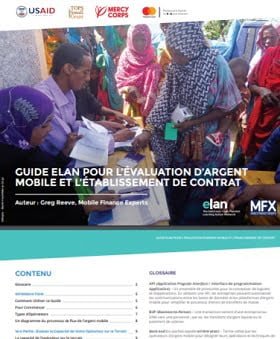
Guide ELAN pour l’évaluation d’argent mobile et l’établissement de contrat
Guides et outils
L’argent mobile offre le potentiel énorme de permettre des transferts d’argent liquide à l’échelle et de relier des participants de programme à des services financiers. Fréquemment, cependant, les professionnels humanitaires ont des difficultés à comprendre la terminologie liée à l’argent...

Aid in context: the importance of market-based approaches to aid delivery in northern Syria
Report
With the Syrian conflict now in its seventh year, 13.5 million Syrians need humanitarian aid. But aid in northern Syria focuses inflexibly on food kits that are expensive to administer, designed to satisfy short-term needs.
Many people sell their food aid to pay for other urgent needs. This
undermines...
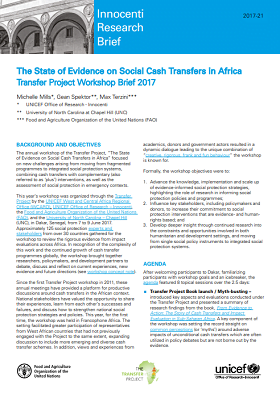
The State of Evidence on Social Cash Transfers in Africa. Transfer Project Workshop Brief 2017
Report
The annual workshop of the Transfer Project, “The State of Evidence on Social Cash Transfers in Africa” focused on new challenges arising from moving from fragmented programmes to integrated social protection systems, combining cash transfers with complementary (also referred to as ‘plus’)...
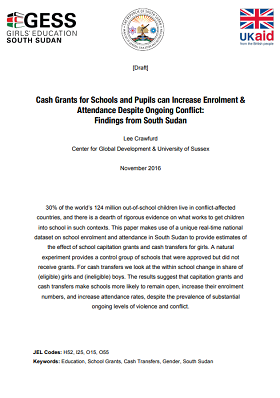
Cash Grants for Schools and Pupils can Increase Enrolment & Attendance Despite Ongoing Conflict: Findings from South Sudan
Report
This paper makes use of a unique, real-time national dataset on school enrolment and attendance in South Sudan to provide estimates of the effect of school capitation grants and cash transfers for girls.
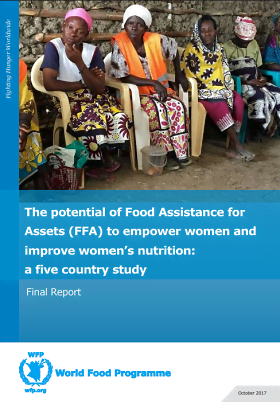
The Potential of Food Assistance for Assets (FFA) to Empower Women and Improve Women’s Nutrition: a five country study
Report
From June 2016 to April 2017, a five-country study to explore the potential of WFP’s Food Assistance for Assets (FFA) programmes to empower women and improve women’s nutrition was conducted by WFP. The purpose of the study was to: 1. Assess changes (outcomes or impacts) that relate to women’s...
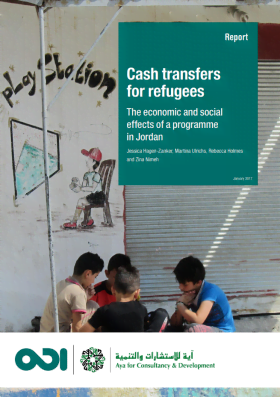
Cash transfers for refugees. The economic and social effects of a programme in Jordan
Report
The world is now experiencing the biggest refugee crisis since the second world war, with around 21.35 million refugees reported in 2015 (UNHCR, 2016a). Those countries with the highest outflow of refugees – Syria, Afghanistan and Somalia in 2015 – are facing ongoing conflicts that are unlikely...

Cash Transfers for Refugees – An Opportunity to Bridge the Gap Between Humanitarian Assistance and Social protection
Report
The world is now experiencing the biggest refugee crisis since the second world war. Many of the countries with the highest outflow of refugees are facing ongoing conflicts that are unlikely to end anytime soon. In fact, most displacement crises are protracted, with 80% lasting ten years or more. The...
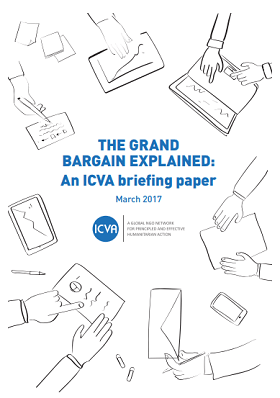
The Grand Bargain Explained: An ICVA Briefing Paper
Guidelines and Tools
ICVA, a global network of humanitarian NGOs dedicated to principled and effective humanitarian action, has created this Grand Bargain briefing paper to support NGOs (and all humanitarian actors) better understand and engage in the Grand Bargain. This briefing paper forms part of ICVA’s humanitarian...

Time for Change: Harnessing the Potential of Humanitarian Cash Transfers
Report
This synthesis report examines the effectiveness of humanitarian cash transfers in Ukraine, Iraq, the Democratic Republic of the Congo (DRC), Mozambique and Nepal. These case studies are building on the work of the High Level Panel on Humanitarian Cash Transfers. The Panel concluded that cash transfers...
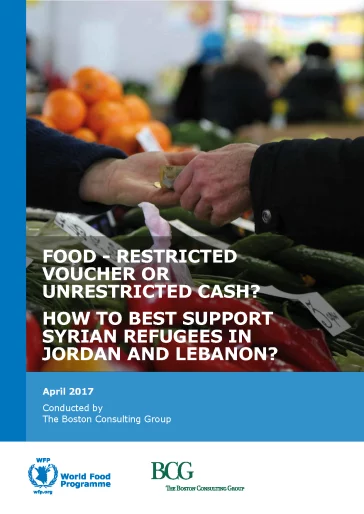
Food – Restricted Voucher or Unrestricted Voucher Cash? How to Best Support Syrian Refugees in Jordan and Lebanon?
Report
The World Food Programme (WFP) plays a pivotal role in the food security of Syrian refugees within the Syria +5 region. WFP periodically reviews its operational approach, so it is timely to consider what the best modality for the next phase of the response might be, including the pros and cons of...

The Livelihood Impacts of Cash Transfers in Sub-Saharan Africa: Beneficiary Perspectives from Six Countries
Report
Cash transfers (CTs) are a social protection mechanism to reduce the poorest households’ vulnerability to shocks and build human
capital by smoothing consumption and sustaining expenditure on education and social welfare.
This study examines whether and how CTs go beyond welfare objectives to promote...
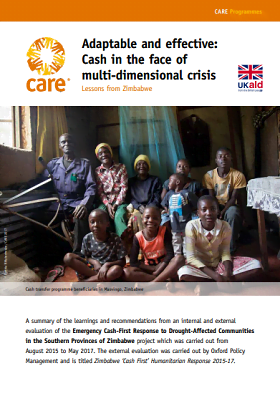
Adaptable and effective: Cash in the face of multi-dimensional crisis
Report
A summary of the learnings and recommendations from an internal and external evaluation of the Emergency Cash-First Response to Drought-Affected Communities in the Southern Provinces of Zimbabwe project which was carried out from August 2015 to May 2017. The external evaluation was carried out by Oxford...
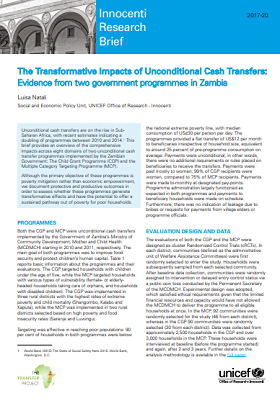
The Transformative Impacts of Unconditional Cash Transfers: Evidence from two government programmes in Zambia
Report
Unconditional cash transfers are on the rise in Sub-Saharan Africa, with recent estimates indicating a doubling of programmes between 2010 and 2014.This brief provides an overview of the comprehensive
impacts across eight domains of two unconditional cash transfer programmes implemented by the...

Scaling up CTP in Somalia: A focus on: CTP options in a changing funding landscape and Improving the use of lesson learning
Report
This report summarises discussions that took place during a half-day event in November 2017. The event built on discussions in September during which a myriad of issues were highlighted and many opportunities for collective action noted. This meeting focused on a more in-depth discussion on two issues...

Renforcer L’Utilisation des Transferts Monetaires Multisectoriels en Afrique de L’Ouest
Rapport
En décembre 2017, le CALP Network et IRC se sont réunis pour organiser un atelier d’apprentissage de deux jours afin d’harmoniser et de partager les expériences des pays travaillant sur la définition du panier de dépense minimum et de combler les lacunes existant sur l’analyse de marché, qui...
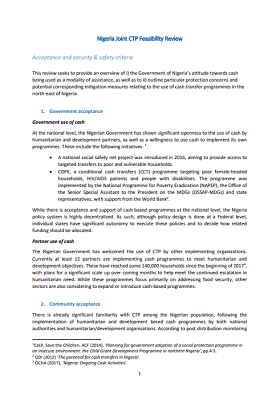
Nigeria Acceptance And Safety Assessment
Guidelines and Tools
This review seeks to provide an overview of i) the Government of Nigeria’s attitude towards cash being used as a modality of assistance, as well as to ii) outline particular protection concerns and potential corresponding mitigation measures relating to the use of cash transfer programmes in the

Enabling Digital Financial Services in Humanitarian Response: Four Priorities for Improving Payments
Guidelines and Tools
The humanitarian sector is increasingly turning to digital payments to distribute cash-based aid, but many efforts remain fragmented around custom built solutions that miss opportunities to build strong, enduring pathways to financial inclusion and resilience for crisis-affected populations. Few solutions...

Challenging the System: Humanitarian Cash Transfers in Iraq
Report
Cash transfers have been used in Iraq to meet the critical basic needs of a highly vulnerable population, providing them dignity and flexibility in a context of uncertainty and economic need. Although Iraq is an appropriate context for the use of cash transfers, factors including government acceptance,...

Effects of Unconditional Cash Transfers on the Outcome of Treatment for Severe Acute Malnutrition (SAM): A Cluster-Randomised Trial in the Democratic Republic of the Congo
Report
Cash transfer programs (CTPs) aim to strengthen financial security for vulnerable households. This potentially enables improvements in diet, hygiene, health service access and investment in food production or income generation.The effect of CTPs on the outcome of children already severely malnourished...